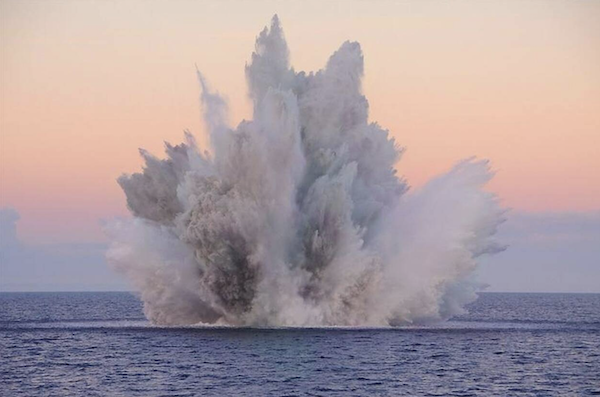The Atlantic and Mediterranean oceans are severely mutilated by war. At their bottoms lie thousands of unexploded weapons dropped during the last two world wars, or deliberately dumped afterwards. In the past and present, belligerent countries have devoted derisory and intermittent resources to getting rid of the submerged munitions.
 © Maritime Prefecture for the Channel and the North Sea
© Maritime Prefecture for the Channel and the North Sea
This past summer, the Geo Ocean III, a red ship flying the Luxembourg flag, and the Venus II, a black watchdog flying the Panama flag, criss-cross the Channel off Dieppe/Le Tréport to sniff out war waste and ward off professional fishermen. The aim of this late, opportunistic and inevitably botched detection campaign is to secure the foundations of 62 industrial wind turbines and the route of underwater power cables. It is set in the Order issued by the Maritime Prefect for the Channel and North Sea on June 23, 2023, which follows up with remarkable diligence on a request dated June 16, 2023 from EMDT (Eoliennes en Mer Dieppe Le Tréport – Wind turbines at sea Dieppe Le Tréport), a company behind which is a consortium of Portuguese, Japanese and French interests.
The detection campaign will be followed by a destruction campaign by the Groupement des plongeurs- démineurs de Cherbourg (Cherbourg mine-clearing divers group). These destructions in bursts release blast effects and acoustic and vibratory energies that mutilate fish, porpoises and other marine mammals.
Between Dunkirk and Cannes, near the coast and beaches, there are at least 81 underwater dumps of conventional and chemical munitions. Heavily battered by underwater swells and attacked by corrosion, they drip arsenic, mercury, perchlorates, residues of trinitrotoluene, dinitrotoluene, trinitrophenol and nitro-diphenyls, a share of carcinogens, mutagens, reprotoxins, neurotoxins, endocrine disruptors, herbicides and algicides.
Following up on a (forgotten) commitment made by the French government at the Grenelle de la Mer in July 2009, Robin des Bois recommended that underwater munitions dumps and shipwrecks containing hazardous materials should be monitored and prioritized as part of the future National Strategy for the Sea and Coast. This proposal was initially accepted in May 2023 by the French Secretary of State for the Sea and the National Council for the Sea and Coastlines. However, it was subsequently withdrawn on the grounds that this Strategy “is not the appropriate framework for military subjects”. The law of secrecy applies to the sea.
Given the ageing of dumped munitions, rising sea levels, seismic activity and furious storms, in the years and decades to come, underwater dumps and wrecks packed with explosives will be subjected to pressures, aggressions and dispersals that will only wake up the inertia of public authorities when it is too late.
Inventories of war waste discoveries and Robin des Bois press releases on the subject
 Imprimer cet article
Imprimer cet article









